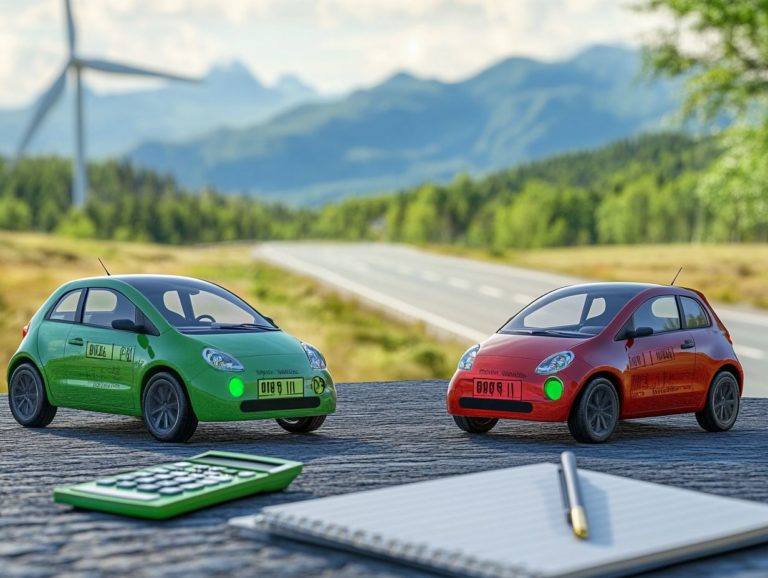Performance Comparison: Gas vs. Electric
In today s energy-conscious landscape, grasping the performance of gas and electric systems is crucial for making informed choices.
This article delves into key factors such as power, efficiency, cost, and environmental impact, offering a comprehensive performance comparison between gas and electric options.
Get ready to discover the strengths and weaknesses of each system! Tailored recommendations are included to help you select the ideal solution that aligns with your unique needs.
Don’t wait dive in now to find your perfect energy solution!
Contents
- Key Takeaways:
- What is Gas and Electric Performance?
- Factors Affecting Performance
- Performance Comparison: Gas vs. Electric
- Choosing the Right Option for Your Needs
- Frequently Asked Questions
- What are the main differences between gas and electric performance?
- Which is more cost-effective, gas or electric appliances?
- How do gas and electric appliances compare in terms of environmental impact?
- Are there any safety concerns with gas or electric appliances?
- Which type of appliance is better for cooking and baking?
- Can I convert my gas appliances to electric or vice versa?
Key Takeaways:
- Understand how gas and electric performance depend on power, efficiency, cost, and environmental impact.
- Gas offers more power and efficiency, while electric options are often more cost-effective and environmentally friendly.
- Identify your specific needs to make the best choice between gas and electric for optimal performance in your situation.
What is Gas and Electric Performance?
Gas and electric performance encompasses the capabilities of vehicles powered by internal combustion engines versus those utilizing electric powertrains. Each appeal to distinct segments of car enthusiasts.
Electric cars, exemplified by the Tesla Model S and Nissan Leaf, are celebrated for their instant acceleration and impressive 0 to 60 mph times.
Meanwhile, gas-powered cars like the Ferrari LaFerrari and Dodge Challenger SRT Hellcat capture the hearts of traditional racing fans with their remarkable top speeds.
As you explore this topic, you ll discover how electric vehicles are redefining performance standards through cutting-edge technology and environmental benefits, guiding us toward a more sustainable future.
Factors Affecting Performance
Numerous factors influence vehicle performance, shaping the comparison between electric cars and gas-powered counterparts.
From the compelling advantages of electric motors particularly their impressive torque curve to the transmission drawbacks inherent in traditional gasoline engines, each vehicle type brings its own set of challenges and benefits.
By grasping how lithium-ion batteries enhance electric vehicle efficiency and considering how engine specifications impact gas-powered performance, you can enable yourself to make informed decisions in your automotive journey.
Power and Efficiency
The power and efficiency of electric cars stand in stark contrast to their gas-powered counterparts, fundamentally shaping your driving experience.
This distinction often stems from the technology that powers each vehicle type. Electric cars harness electric motors that deliver power instantaneously, providing seamless torque.
This erases the delays commonly associated with traditional gas engines. On the other hand, gas-powered vehicles must contend with the complexities of engine revolutions to achieve peak performance, which can leave you feeling less connected to the road.
When evaluating these differences, metrics like horsepower and torque ratings come into play, typically assessed through power tests.
These tests reveal how effectively a vehicle harnesses its power, giving you a glimpse of what to expect in everyday driving scenarios.
By examining these performance metrics, you can gain a clearer understanding of how an electric vehicle might elevate your commuting experience enhancing acceleration, handling, and overall driving pleasure.
Cost and Environmental Impact
When you re weighing the cost and environmental impact of electric cars versus gas-powered vehicles, several key factors come into play that influence your choices and perceptions.
While electric cars might hit your wallet harder upfront, they can lead to substantial savings over time through reduced fuel expenses and lower maintenance needs.
They also provide significant environmental benefits, such as decreased carbon emissions. With advancements in renewable energy and an expanding network of charging stations, electric vehicles are becoming an increasingly appealing option for those who care about the planet.
With fuel prices soaring, now is the perfect time to explore the benefits of electric vehicles! You ll likely see that gas-powered vehicles can become pricey over time, nudging you to consider the long-term financial advantages of electric alternatives.
Maintenance for electric cars is a breeze, too, given that they have fewer moving parts and don t require oil changes, making them even more cost-effective.
Take advantage of available incentives like tax credits and rebates! These can help offset those initial expenses.
As awareness grows about the urgent need for sustainable solutions, the importance of charging infrastructure in providing easy access to electricity becomes clear. This paves the way for a cleaner and more sustainable transportation future.
Performance Comparison: Gas vs. Electric
When you conduct a performance comparison between gas and electric cars, the differences in driving experience become strikingly clear, especially when you consider metrics like instant acceleration and top speed.
Gas-powered vehicles, such as the McLaren P1 and Porsche 918, offer exhilarating thrills with their high performance and storied racing heritage.
On the other hand, electric cars like the Chevrolet Bolt EV and Hyundai Kona Electric harness cutting-edge technology to deliver rapid acceleration and a distinct driving sensation, challenging everything you thought you knew about performance.
This comparison not only showcases the pros and cons of each category but also reveals the dynamic shifts taking place in the automotive landscape.
Pros and Cons of Each Option
Examining the pros and cons of electric cars versus gas-powered vehicles presents a nuanced landscape of benefits and drawbacks that can significantly influence your purchasing decision.
Electric vehicles (EVs) offer benefits like lower maintenance costs and eco-friendliness, while gas cars have the convenience of a widespread network of gas stations, making those long road trips much less of a hassle.
As electric vehicles capture more attention with technological advancements like faster charging and improved battery life, it’s essential for you to consider the infrastructure challenges and range anxiety the fear of running out of battery before reaching a charging station that might hold you back.
You ll find that electric cars generally require less routine maintenance due to their fewer moving parts, which can lead to lower ownership costs in the long run. Each option offers a distinct set of trade-offs, and grasping these complexities is vital as you navigate the ever-evolving automotive market.
Choosing the Right Option for Your Needs
Regarding choosing between an electric car and a gas-powered vehicle, you’ll want to take a thoughtful approach that aligns with your personal needs and preferences.
Consider aspects such as performance, cost, and environmental impact. Your driving habits, the availability of charging stations, and the total cost of ownership which includes all costs associated with owning a car, not just the purchase price are pivotal factors in this decision-making journey.
Think about what matters most to you do you crave the instant acceleration and sustainability that electric vehicles provide, or do you lean towards the traditional power and speed that gas-powered cars deliver?
This choice is about finding the perfect fit for your lifestyle and values.
Which option suits your lifestyle best? Start your journey towards a sustainable future today!
Considerations and Recommendations
When deciding whether to invest in an electric car or a gas-powered vehicle, there are several key considerations to keep in mind. Start by evaluating the availability of charging stations and understanding your performance needs.
Additionally, consider the impact on the environment over time. These steps are crucial in navigating the increasingly complex automotive landscape.
Research testimonials and reviews from Motor Trend to gain insights about popular models that can guide your choice.
Take the time to assess your daily driving habits and the types of journeys you typically undertake. This reflection will help you determine whether the range offered by electric vehicles aligns with your needs or if the convenience of refueling a gas-powered option suits you better.
Explore available government incentives for electric car purchases, as these can significantly lower your upfront costs. Compare the overall cost of ownership for both vehicle types, including maintenance, insurance, and fuel expenses. This comprehensive approach will ultimately guide you toward a more informed decision that aligns with your financial and ethical considerations.
Frequently Asked Questions
Curious about the differences between gas and electric appliances? Here s everything you need to know!
What are the main differences between gas and electric performance?
Gas appliances typically provide faster heating and cooking times. On the other hand, electric appliances often offer more precise temperature control and can be more energy efficient.
Which is more cost-effective, gas or electric appliances?
The cost-effectiveness of gas versus electric appliances depends on the energy costs in your area and the efficiency of your specific appliances. In general, gas appliances tend to be more cost-effective for heating and cooking, while electric appliances may shine in cooling and drying.
How do gas and electric appliances compare in terms of environmental impact?
Gas appliances produce emissions that contribute to air pollution and can have negative health effects. In contrast, electric appliances do not emit harmful pollutants directly; however, the production of electricity can have environmental impacts, such as carbon emissions from power plants.
Are there any safety concerns with gas or electric appliances?
Both gas and electric appliances have important safety considerations. Gas appliances can risk gas leaks and carbon monoxide poisoning, while electric appliances may pose risks of electrical shocks or fires. Always follow safety guidelines for both types.
Which type of appliance is better for cooking and baking?
Many professional chefs prefer gas appliances for cooking and baking due to their precise temperature control and quick heating abilities. However, electric appliances can also produce excellent results with their even heating and ability to maintain consistent temperatures.
Can I convert my gas appliances to electric or vice versa?
In some cases, it is possible to convert gas appliances to electric or vice versa. However, this can be complex and expensive. Always consult a professional before attempting any conversions to ensure safety and feasibility.
Ready to make your choice? Dive into more details and discover the perfect vehicle for your lifestyle!



